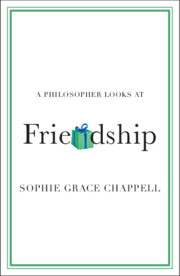Book contents
- A Philosopher Looks at Friendship
- A Philosopher Looks at
- A Philosopher Looks at Friendship
- Copyright page
- Dedication
- Contents
- Acknowledgements
- Prelude: Eighteen Aphorisms
- 1 Three Friendships – and Lots of Questions
- 2 Philosophers of Friendship: An Apology
- 3 Why I Don’t Start with a Formal Definition of Friendship
- 4 Examples of Friendship
- 5 Beginning the Natural History of Friendship
- 6 Deepening the Natural Historical Account
- 7 Being with Others
- 8 Lewis’s Four Loves – and Nygren’s Two
- 9 Aristotle’s Three Kinds of Philia – and Aristotle’s Will
- 10 Friendship, Love, and Second-Personality
- 11 Friendship as an Unemphatic Good
- 12 Bertrand Russell and His Over-Emphatic ‘German’ Friend
- 13 Sensitivity to Tacit Knowledge
- 14 Innocence
- 15 Moralism
- 16 Roles and Spontaneity
- 17 The Benefits of Friendship
- 18 Eighteen Quick Questions and Eighteen Quick Answers
- References
- Index
12 - Bertrand Russell and His Over-Emphatic ‘German’ Friend
Published online by Cambridge University Press: 09 November 2024
- A Philosopher Looks at Friendship
- A Philosopher Looks at
- A Philosopher Looks at Friendship
- Copyright page
- Dedication
- Contents
- Acknowledgements
- Prelude: Eighteen Aphorisms
- 1 Three Friendships – and Lots of Questions
- 2 Philosophers of Friendship: An Apology
- 3 Why I Don’t Start with a Formal Definition of Friendship
- 4 Examples of Friendship
- 5 Beginning the Natural History of Friendship
- 6 Deepening the Natural Historical Account
- 7 Being with Others
- 8 Lewis’s Four Loves – and Nygren’s Two
- 9 Aristotle’s Three Kinds of Philia – and Aristotle’s Will
- 10 Friendship, Love, and Second-Personality
- 11 Friendship as an Unemphatic Good
- 12 Bertrand Russell and His Over-Emphatic ‘German’ Friend
- 13 Sensitivity to Tacit Knowledge
- 14 Innocence
- 15 Moralism
- 16 Roles and Spontaneity
- 17 The Benefits of Friendship
- 18 Eighteen Quick Questions and Eighteen Quick Answers
- References
- Index
Summary
In the autumn term of 1911, the relatively equable and straightforward Bertrand Russell (who was thirty-nine at the time) began a friendship with a strange and wild-eyed foreigner, a twenty-two-year-old Manchester University engineering student, who began to show up repeatedly at Russell’s door in Staircase I of Nevile’s Court, Trinity College Cambridge. ‘[C. K. Ogden and I] were in the middle of … a lot of complicated problems [in mathematical logic] when an unknown German appeared, speaking very little English but refusing to speak German …’ (Russell, letter to Lady Ottoline Morrell, 18 October 1911, in McGuinness 1988, 89).
- Type
- Chapter
- Information
- A Philosopher Looks at Friendship , pp. 132 - 139Publisher: Cambridge University PressPrint publication year: 2024

